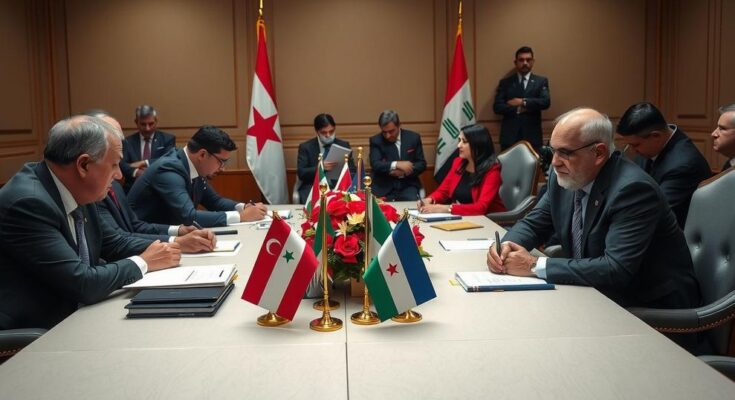Egyptian President Al-Sisi emphasizes Syria’s unity, while Turkish President Erdoğan advocates for international cooperation in reconstruction. The Syrian opposition pushes for transitional justice and a comprehensive political process, with calls for inclusive governance and adherence to UN resolutions. Russia and France engage diplomatically, urging for state integrity and addressing humanitarian needs.
Egyptian President Abdel Fattah Al-Sisi underscored the criticality of maintaining Syria’s unity and territorial integrity during a recent phone conversation with Cypriot President Nikos Christodoulides. Al-Sisi stressed the necessity for a comprehensive political process that encompasses all segments of the Syrian populace. In a related context, Turkish President Recep Tayyip Erdoğan called for enhanced international cooperation aimed at the reconstruction of Syria, following the ousting of former President Bashar Al-Assad by armed factions. Erdoğan asserted, “Turkey is combating terrorist organizations to protect its national security and end the state of instability in Syria as quickly as possible” while addressing the Emir of Qatar.
The head of the Syrian Negotiation Commission, Bader Jamous, proclaimed that transitional justice in Syria is essential, advocating for the continued pursuit of legal action against the previous regime. He emphasized the need for a comprehensive national government to represent all Syrians and proposed gathering for a national conference to select a constitutional assembly. Jamous reiterated that free and fair elections should be supervised by the United Nations following a constitutional referendum. Discussions were also held concerning the implementation of UN Security Council Resolution 2254, which outlines a path toward political transition.
On an international level, Russia’s UN representative, Vasily Nebenzya, noted the proximity of Israeli forces to Damascus and emphasized the necessity for maintaining Syrian state institutions. He also advocated for the lifting of sanctions against Syria. The UN Special Envoy to Syria, Geir Pedersen, highlighted the importance of an inclusive political transition to secure vital economic support for the nation, noting that “the needs are immense and can only be addressed through broad support.” Furthermore, Tom Fletcher of the UN reported humanitarian crises affecting over 70% of Syria’s population, deepened by a significant lack of essential supplies.
In a notable diplomatic shift, the French Foreign Ministry disclosed that French diplomats had interacted with Syrian transitional authority representatives. They urged adherence to an inclusive political transition while announcing the raising of the French flag over its reopened embassy in Damascus after a closure lasting twelve years. France, which severed ties with Al-Assad in 2012, reiterated its commitment to a credible and inclusive political process consistent with UN frameworks.
This article addresses the complex geopolitical landscape surrounding Syria as various nations and organizations engage in discussions about its future amidst ongoing conflict and humanitarian crises. Egypt’s call for political unity, Turkey’s push for reconstruction alongside its security concerns involving Kurdish factions, and the Syrian opposition’s demands for just governance reflect the multifaceted challenges present in the region. Additionally, international responses, including those from Russia and France, signify a shift in diplomatic engagement as the Syrian conflict continues to evolve.
In summary, the situation in Syria remains precarious as international stakeholders emphasize the importance of unity, reconstruction, and an inclusive political process. Egyptian and Turkish leaders advocate for a comprehensive strategy involving all Syrian people, while the Syrian opposition calls for transitional justice and adherence to established resolutions. As geopolitical interests align, the humanitarian crisis necessitates urgent attention, highlighting the critical need for collaboration among global entities to support Syria’s pathway towards stability and reconstruction.
Original Source: www.dailynewsegypt.com




